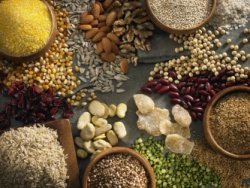Anti-Inflammation Diet

An anti-inflammation diet can combat chronic or “silent inflammation”. Silent inflamation is a low grade inflamation that can exist for months or even years throughout your body without you feeling the pain. This means your body can suffer without the pain while the chronic inflammation takes it's toll on your body.
It can be caused by things like rheumatoid arthritis, autoimmune disorders, physical stress and other causes. Silent inflammation has been shown to cause disease and degeneration in the body.
Silent Inflammation
Featured Articles
Silent inflammation can be present and undetected in your body for years, until it manifests into diseases.
These diseases can be heart disease, Alzheimer's, diabetes and some cancers. This problem has been linked with the buildup of cholesterol deposits in the arteries and inflammation of brain tissue resulting in heart disease and Alzheimer’s disease. Elevated blood sugar and insulin levels such as those experienced by type 2 diabetes also aggravate inflammation.
While medications and other treatments are important to combat your health problems, making the necessary lifestyle changes to fight inflammation can help you as well. Changing your eating habits is not a cure all for say rheumatoid arthritis, it might lesson the symtoms or flare ups.
Even if a change in diet doesn't help with your condition, an anti-inflammatory diet is considered as healthy and may help lower your chances of having other problems.
What to Eat
Anti-Inflammation Diet & Fatty Acids
Essential fatty acids play an important role in fighting inflammation, and can be obtained in the diet from vegetables, nuts, grains and seeds such as sesame and sunflower seeds.
However, there are some essential fatty acids which cannot be made by the body. These need to be obtained from the diet.
Fish should also be a part of your diet. Have fish at least 2 times a week to get critical fatty acids like Omega 3's which fight inflammation. If you can't get fish in your diet, fish oil supplements also contain Omega 3’s.
Fruits and Veggies
It seems all diets call for lots of veggies and fruits. An anti-inflammation diet is no different. When selecting fruits and veggies, pick a variety in flavors and colors.
Leafy greens like kale and spinach have shown to curb inflammation as well as broccoli and cabbage.
In the fruit sector of foods, items like raspberries, blackberries and cherries have shown to help. It is the substance in these fruits that give their color that is a type of pigment that is an anti-inflammatory.

Grains, Beans, Nuts & Spices
Whole grains, such as whole wheat bread, brown rice, oatmeal and other unrefined grains are typically higher in fiber than other foods. Fiber also may be helpful reducing inflammation.
Beans are also high in fiber, which is good. But they are also loaded with antioxidants and other anti-inflammatory substances. And of course nuts are high in the type of fats that help with inflammation. Be careful not to go crazy with the nuts as the fats and calories will add up quickly.
Spices such as turmeric, ginger, and hot peppers also reduce inflammation.
What Not to Eat
While there are plenty of foods to choose from for an anti-inflammation diet, there are some that you should try to avoid. Here are a few to try and avoid.
Sweets and Soda
Sweets such as cookies, cakes and sugary pops do not provide much nutrients. These types of foods can easily be overeaten which can lead to high blood sugars, overweight and high cholesterol. The sugar in these foods release inflammatory messengers called cytokines.
Foods that cause a spike in insulin levels, such as sugary foods, or foods with a high glycemic load increase inflammation. To actively reduce inflammation, you should eat foods that have a low Glycemic load.

Fatty Foods
Try reducing consumption of foods that are pro-inflammatory, such as red meat. The high saturated fats in these foods can cause inflammation if you have more than a small daily amount.
Buttermilk, whole milk and cheeses are also high in saturated fats and should be minimized or avoided in your daily diet. Try the low fat versions as an alternative.
Fried and greasy foods should also be avoided. Things like fried chicken, french fries other other fried foods cooked in vegetable oil introduces Omega-6 fatty acids.
Although you need some Omega-6, these foods will introduce too much and throw off the balance between Omega-6 and Omega 3. The end result will be more inflammation.
Also be aware of the amount of trans-fat in your foods. Trans fat can raise your LDL Cholesterol, which causes inflammation.
Additional Articles
Counting Carbs or Making Carbs Count
Make your carbs count by eating the right ones. Read this article to learn more about carbohydrates and what foods to eat when it comes to carbs.
Diabetic Diets
If you have diabetes then you know how important it is to eat the right foods to help maintain healthy blood sugar levels. Find out more about
diabetic diets and how to eat healthier foods.
Healthy Recipes
Check out the recipes on this website and find a new one for your next meal. From breakfast to dinners, snacks to desserts, you can find something
to wake up your taste buds without adding all the extra fats and sugars.



